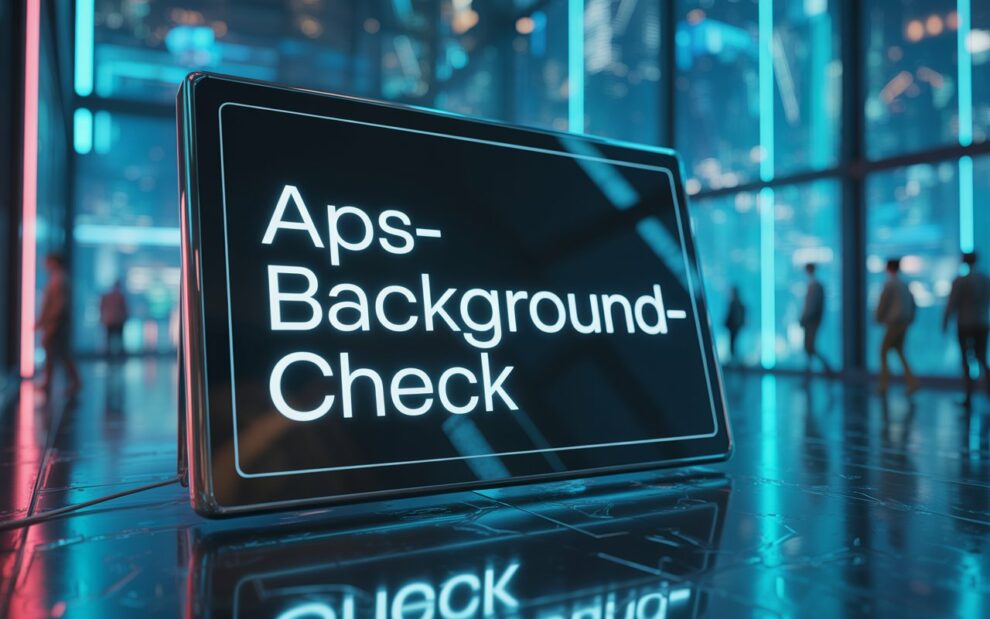Safeguard Your Future in 2025: Navigate APS Background Checks for Secure Opportunities in Care and Housing!
Table of Contents
Safeguard Your Future in 2025: Navigate APS Background Checks for Secure Opportunities in Care and Housing! In 2025, background checks remain a cornerstone of ensuring safety and trust in environments involving vulnerable populations, such as the elderly or disabled. Among these, the Adult Protective Services (APS) background check is a critical screening tool designed to identify individuals with substantiated allegations of abuse, neglect, or exploitation of vulnerable adults. These checks are essential in sectors like healthcare, homecare, senior housing, and professional licensing, where protecting vulnerable individuals is paramount. This article provides a comprehensive overview of APS background checks in 2025, covering their definition, applications, regulations, challenges, integration with other screenings, and strategies for compliance. With evolving laws like Arizona’s HB2764 and increasing emphasis on safeguarding vulnerable adults, understanding APS background checks is crucial for employers, employees, tenants, and licensing bodies.
What is an APS Background Check?
An APS background check is a specialized screening process that queries state-managed Adult Protective Services registries to determine if an individual has a history of substantiated allegations of abuse, neglect, or financial exploitation against vulnerable adults, such as those who are elderly (typically 60+), disabled, or otherwise unable to protect themselves due to physical or mental impairments. APS agencies, overseen by state departments like Health and Human Services or Economic Security, investigate reports of mistreatment and maintain registries of substantiated cases. These checks are used by employers, landlords, and licensing boards to ensure candidates or tenants pose no risk to vulnerable populations.
Key Components
- Scope: Focuses on substantiated cases of physical abuse (e.g., striking an elderly person), emotional abuse (e.g., verbal harassment), neglect (e.g., failing to provide necessary medical care), or financial exploitation (e.g., stealing funds from a disabled adult).
- Sources: State-specific APS registries, such as Arizona’s APS Registry maintained by the Arizona Department of Economic Security (DES), or similar databases in other states.
- Purpose: Prevents individuals with a history of harming vulnerable adults from being placed in positions of trust, such as caregivers, homecare aides, or residents in senior living facilities.
- Process: Involves submitting identifiers like name, Social Security number, or date of birth to query the APS registry, often alongside other checks like fingerprint-based criminal screenings.
Example
A homecare agency in Arizona conducts an APS background check in 2025 to ensure a prospective caregiver has no substantiated allegations of elder neglect listed in the Arizona APS Registry, complying with HB2764 requirements.
Applications of APS Background Checks
APS background checks are mandated or recommended across various sectors in 2025 to protect vulnerable adults. Key applications include:
Healthcare and Homecare Employment:
Screening for roles involving direct care or support for elderly or disabled adults, such as nurses, home health aides, or residential care staff.
- States like Arizona, under HB2764 (effective 2024), require homecare agencies, nursing homes, and residential care facilities to verify that employees and contractors are not listed on the APS Registry by March 31, 2025.
- These checks ensure caregivers have no history of abuse or neglect, protecting vulnerable clients.
- Often paired with Level 1 fingerprint clearance cards, which screen for broader criminal history.
Example: A Tucson nursing home confirms a new aide’s APS status to ensure no history of financial exploitation before hiring.
Volunteer Organizations:

Screening volunteers who interact with vulnerable adults in settings like senior centers, disability support programs, or meal delivery services.
- Organizations like Meals on Wheels or senior daycare programs require APS checks to ensure volunteers pose no risk to clients.
- In Nevada, state laws mandate background checks, including APS registry verification, for volunteers serving vulnerable adults.
Example: A volunteer applying to deliver meals to seniors in Las Vegas clears an APS check to confirm no abuse history.
Tenant Screening in Senior Housing:
Verifying that prospective tenants in senior living facilities or assisted living communities have no APS registry records.
- Landlords use APS checks to protect residents from potential abuse or exploitation, particularly in communal living environments.
- These checks complement criminal background checks, focusing on adult protection issues.
Example: A Phoenix assisted living facility screens a new resident to ensure no substantiated allegations of elder abuse.
Licensing and Certification:
Required for professionals seeking licenses in fields like social work, caregiving, or adult education involving vulnerable adults.
- In New Mexico, educators working with special needs adults must submit APS checks for licensure through the New Mexico Public Education Department (NMPED), using ORI codes like NM920140Z.
- Licensing boards may deny or revoke credentials for individuals listed on APS registries.
Example: A social worker in Albuquerque clears an APS check to obtain a license for working with disabled adults.
Regulatory Framework for APS Background Checks
APS background checks, which screen for substantiated allegations of abuse, neglect, or exploitation of vulnerable adults in state APS registries, are governed by a combination of federal and state laws. These laws ensure compliance, protect individual rights, and promote fairness in screening processes for employment, housing, and licensing. Below are the primary laws, each defined and named, that shape APS background checks in 2025.
1. Fair Credit Reporting Act (FCRA)
A federal law enacted in 1970, administered by the Federal Trade Commission and the Consumer Financial Protection Bureau, that regulates the collection, dissemination, and use of consumer information, including background checks conducted by consumer reporting agencies (CRAs).
Application to APS Background Checks:
- Consent Requirement: The FCRA mandates that employers, landlords, or other entities obtain written consent from an individual before conducting an APS background check through a third-party CRA. This ensures transparency about the check’s purpose and scope.
- Adverse Action Notices: If an APS check results in a rejection (e.g., for a job or housing), the FCRA requires a pre-adverse action notice (including a copy of the report and dispute rights) and a final adverse action notice. This allows individuals to review and dispute inaccuracies.
- Dispute Process: Individuals can dispute inaccurate APS registry listings, and CRAs must investigate within 30 days, correcting errors to prevent unfair denials.
- Penalties: Non-compliance can lead to fines of up to $1,000 per violation, statutory damages, or class-action lawsuits, making FCRA adherence critical.
- Example: A Nevada employer using a CRA to query the state’s APS Registry must provide a candidate with a pre-adverse action notice if the check reveals a substantiated allegation, allowing the candidate to dispute the finding.
2. Privacy Act of 1974
A federal law that governs the collection, maintenance, use, and dissemination of personally identifiable information by federal agencies, with provisions extending to state agencies handling sensitive data in background checks.
Application to APS Background Checks:
- Data Security: The Privacy Act requires secure handling of sensitive identifiers, such as Social Security numbers or fingerprints, used in APS checks, particularly when integrated with fingerprint-based screenings.
- Notification: Individuals must be informed of the purpose of data collection, ensuring transparency when APS registries are queried.
- State Agency Compliance: State APS agencies maintaining registries, like Arizona’s Department of Economic Security, must adhere to Privacy Act standards when sharing data with CRAs or employers.
- Example: An Arizona APS background check involving fingerprint data for a homecare worker must comply with Privacy Act requirements, ensuring encrypted storage and clear notification of data use.
3. Arizona House Bill 2764 (HB2764, 2024)
A state law enacted in Arizona in 2024 that strengthens background check requirements for homecare and healthcare workers, specifically mandating verification against the Arizona APS Registry.
Application to APS Background Checks:
- Mandatory APS Checks: HB2764 requires homecare agencies, nursing homes, and residential care institutions to verify that employees, contractors, and volunteers are not listed on the Arizona APS Registry for substantiated allegations of abuse, neglect, or exploitation by March 31, 2025.
- Fingerprint Clearance: For workers not licensed under Title 32 (e.g., non-regulated healthcare professions), HB2764 mandates obtaining a Level 1 fingerprint clearance card within 20 days of employment, complementing APS checks.
- Penalties for Non-Compliance: Employers failing to comply must terminate listed individuals and face civil penalties of up to $1,000 per violation, potential license revocation, or other sanctions.
- Implementation: The law ensures that healthcare facilities prioritize the safety of vulnerable adults by screening for APS records, with a focus on timely compliance by the 2025 deadline.
- Example: A Phoenix homecare agency must terminate an employee found on the Arizona APS Registry by March 31, 2025, to avoid a $1,000 fine and maintain its operating license under HB2764.
4. California Fair Chance Act (SB 639, Expanded in 2018)
A California state law, part of the broader “ban-the-box” movement, that restricts employers from inquiring about or considering criminal history—and by extension, certain background check data like APS records—until after a conditional job offer is made.
Application to APS Background Checks:
- Delayed Inquiries: Employers must delay APS background checks until after issuing a conditional offer, ensuring candidates are evaluated based on qualifications first.
- Individualized Assessment: If an APS check reveals a substantiated allegation, employers must conduct an individualized assessment, considering factors like the nature of the allegation, time elapsed, and rehabilitation evidence, to avoid discriminatory rejections.
- Compliance with FCRA: The Fair Chance Act aligns with FCRA requirements, mandating adverse action notices and dispute rights for APS check rejections.
- Example: A California homecare employer delays an APS check until after offering a job to a caregiver, then assesses a 10-year-old APS listing with rehabilitation evidence before making a final decision.
5. Maine LD 1167 (Fair Chance Employment Act, 2021)
A Maine state law that prohibits employers from inquiring about or considering criminal history or certain background check data, including APS records, on initial job applications, promoting fair hiring practices.
Application to APS Background Checks:
- Prohibited Early Inquiries: Employers cannot ask about APS registry status or related issues on job applications, delaying checks until later in the hiring process, typically post-offer.
- Fair Evaluation: The law ensures candidates are judged on skills and qualifications, reducing the immediate impact of APS listings.
- Alignment with FCRA: Like other fair chance laws, LD 1167 requires FCRA-compliant consent and adverse action processes for APS checks.
- Example: A Maine senior center employer omits APS-related questions from its job application, conducting the check only after a conditional offer to comply with LD 1167.
6. Nevada Revised Statutes (NRS) Chapter 449 (Medical Facilities and Other Related Entities)
A set of Nevada state statutes governing licensing and operation of medical facilities, including homecare agencies and residential care institutions, with provisions for mandatory background checks for employees and volunteers.
Application to APS Background Checks:
- Mandatory Screening: NRS Chapter 449 requires homecare agencies and facilities serving vulnerable adults to conduct background checks, including APS registry verification, to ensure no substantiated allegations of abuse or neglect.
- Volunteer Requirements: Volunteers in programs serving vulnerable adults, such as senior or disability services, must also undergo APS checks to protect clients.
- Compliance Oversight: The Nevada Department of Health and Human Services enforces these requirements, with penalties for non-compliance including fines or license suspension.
- Example: A Las Vegas homecare agency verifies a volunteer’s APS status under NRS Chapter 449 to ensure no history of elder abuse before allowing them to assist clients.
7. New Mexico Administrative Code (NMAC) Title 8, Chapter 100 (Licensing for Educators)
A set of New Mexico state regulations governing licensure for educators, including those working with special needs or vulnerable adults, requiring background checks as part of the licensing process.
Application to APS Background Checks:
- Licensure Requirement: Educators applying for licenses through the New Mexico Public Education Department (NMPED), particularly for roles involving vulnerable adults, must submit APS background checks using specific ORI codes (e.g., NM920140Z).
- Registry Verification: The NMPED verifies that applicants are not listed on New Mexico’s APS Registry for substantiated allegations, ensuring suitability for roles with vulnerable populations.
- Denial or Revocation: A substantiated APS listing can result in license denial or revocation, protecting students and clients.
- Example: A New Mexico educator applying to work with special needs adults clears an APS check through the NMPED to obtain their license, ensuring no history of neglect.
Integration with Other Screening Processes

Integrating APS (Adult Protective Services) background checks with other screening processes is essential for creating a comprehensive and streamlined vetting system, especially in healthcare, social services, and caregiving environments. Rather than treating APS checks as a standalone procedure, organizations benefit greatly by embedding them within broader hiring and compliance workflows. This integration ensures consistency, reduces redundancy, and enhances overall safety for vulnerable populations.
Holistic Vetting Approach
Most roles that require APS checks also demand other forms of background verification, such as criminal record checks, fingerprinting, abuse registry clearances, drug testing, and license verification. Integrating these processes allows agencies and employers to view an applicant’s qualifications and risk factors in one centralized system. This reduces the chance of overlooking red flags that may be caught in one system but missed in another.
Efficiency and Reduced Processing Times
By linking APS background checks with other pre-employment screenings, organizations can reduce duplicated efforts and expedite hiring timelines. Many states offer digital platforms or portals that allow multiple screenings to be requested simultaneously or through a single application process. For example, an integrated system may automatically route a candidate through APS, criminal, and healthcare worker registries, ensuring faster results and fewer administrative errors.
Consistency in Policy Enforcement
Integrated screening helps ensure that background check policies are applied uniformly across departments and roles. This prevents discrepancies in how checks are conducted or interpreted and reduces the risk of legal or regulatory non-compliance. It also supports a clear audit trail for investigators or licensing bodies in the event of a compliance review.
Enhanced Data Accuracy and Reporting
When screening systems are integrated, organizations benefit from real-time data sharing and consolidated reporting. This improves the accuracy of applicant records, helps identify trends in disqualifications, and supports better decision-making. Integrated systems often flag inconsistencies or automatically request updated documents if needed.
Improved Candidate Experience
Applicants also benefit from integrated systems. Rather than filling out multiple forms and navigating various screening processes, candidates can complete one comprehensive application, reducing frustration and confusion. This smoother experience helps maintain a positive reputation for the hiring organization, especially in competitive fields like healthcare and social work.
Challenges of APS Background Checks
Adult Protective Services (APS) background checks are essential for ensuring the safety of vulnerable adults in care settings. However, these checks present several operational, legal, and systemic challenges that can complicate hiring, delay services, or create inconsistencies in enforcement. Below are the key challenges explained:
1. Lack of Standardization Across States
APS systems are state-run, meaning there is no national APS database or unified federal guideline. Each state defines:
- What qualifies as abuse, neglect, or exploitation
- How APS investigations are conducted
- How long records are retained
- Who is eligible to access APS findings
This fragmented structure makes it difficult for employers who operate in multiple states or hire applicants from different jurisdictions.
2. Inconsistent Reporting and Recordkeeping
Not all APS reports lead to formal investigations or substantiated findings. Yet, in some states:
- Even unsubstantiated or unfounded reports may appear in background checks.
- There is often no standard appeal process for individuals seeking to remove inaccurate or outdated entries.
- Record retention varies widely — some states may keep entries for years, even after exoneration.
This inconsistency can unfairly affect applicants’ employment prospects or licensure eligibility.
3. Limited Access to APS Records
Many APS records are considered confidential, and access may be limited to:
- Employers in specific fields (e.g., healthcare, social work)
- Licensing boards
- Law enforcement agencies
This restrictiveness can make it difficult to verify information or obtain necessary documentation for hiring or appeals.
4. Lengthy Processing Times
APS background checks are often manual and slow, especially if:
- Requests require inter-agency communication
- There’s no digital system in place
- The agency is understaffed or underfunded
Delays in receiving APS background check results can hold up hiring, credentialing, or placement for weeks or months.
5. Legal and Ethical Gray Areas
Unlike criminal background checks that require clear legal thresholds, APS checks may involve:
- Allegations that were never criminally prosecuted
- Findings based on interviews rather than hard evidence
- No requirement to notify the person being investigated
This can raise due process concerns and leave individuals with no opportunity to dispute records that affect their employment or reputation.
6. False Positives and Misidentification
In some cases, individuals with similar names or personal details may be confused with others in APS records. Without biometric verification or precise matching, people can be:
- Mistakenly flagged
- Required to undergo additional investigation
- Denied employment based on incorrect data
7. Limited Public Awareness and Education
Many applicants and employers are unaware of what an APS background check involves. There is a general lack of transparency about:
- What data is collected
- How it’s interpreted
- How it impacts hiring or licensing
This lack of awareness can lead to miscommunication, compliance issues, or discriminatory practices.
Impact on Vulnerable Populations
PS (Adult Protective Services) background checks are designed to protect elderly and disabled adults from abuse, neglect, and exploitation. While these checks serve an essential role in promoting safety, they can also have unintended consequences for the very individuals they aim to protect. On the positive side, background checks help ensure that caregivers, social workers, and service providers do not have histories of abuse, criminal behavior, or substantiated claims of neglect. This filtering process strengthens trust in caregiving environments and reduces the likelihood of vulnerable adults being harmed.
However, the implementation of these checks can sometimes delay access to essential care services. Processing times for background checks—especially in areas with staffing shortages or outdated systems—may slow down the hiring of qualified caregivers or stall emergency placements. In communities where care workers are already in short supply, these delays can result in seniors or adults with disabilities being left without the support they urgently need. Additionally, overly strict or poorly interpreted regulations may disqualify potentially good caregivers over minor or unrelated infractions, further shrinking the available workforce and impacting timely service delivery. Thus, while APS background checks are vital for safeguarding at-risk populations, they must be balanced with efficient processes to avoid causing harm through inaccessibility or delays in care.
Strategies for Navigating APS Background Checks

To effectively manage APS background checks in 2025, stakeholders can adopt these strategies:
Partner with Compliant CRAs:
- CRAs like APS Background Screening ensure FCRA-compliant searches across state registries.
- Verify data with state agencies to avoid errors.
- Example: A homecare agency uses a CRA to query Arizona’s APS Registry.
Understand State Regulations:
- Review laws like Arizona’s HB2764 or New Mexico’s licensure rules.
- Consult legal counsel for multi-state compliance.
- Example: A California employer delays APS checks to comply with the Fair Chance Act.
Obtain Informed Consent:
- Provide FCRA-compliant disclosures about the check’s scope.
- Issue adverse action notices if rejecting a candidate.
- Example: An employer provides a consent form before an APS check.
Encourage Proactive Disclosure:
- Disclosure allows providing rehabilitation evidence, influencing decisions.
- Builds trust and streamlines screening.
- Example: A caregiver discloses a resolved APS allegation with rehabilitation proof.
FAQs
1. What is an APS background check, and who needs one in 2025?
An APS background check screens for substantiated allegations of abuse, neglect, or exploitation in state APS registries. It’s required for healthcare workers, homecare aides, volunteers with vulnerable adults, and sometimes tenants in senior housing, especially in states like Arizona under HB2764.
2. How does Arizona’s HB2764 impact APS background checks in 2025?
HB2764 mandates that homecare agencies, nursing homes, and residential care institutions verify that employees and contractors are not on Arizona’s APS Registry by March 31, 2025. Non-compliance risks employee termination and fines up to $1,000 per violation.
3. Can I dispute an inaccurate APS background check finding?
Yes, under the FCRA, you can dispute inaccurate APS registry listings by contacting the CRA or state APS agency. The CRA must investigate within 30 days, and employers must provide dispute rights in adverse action notices.
4. Are APS background checks mandatory nationwide?
No, APS checks are state-specific, with requirements varying by jurisdiction. States like Arizona, New Mexico, and Nevada mandate them for certain roles, but there’s no national APS registry. Check state laws for compliance.
Conclusion
In 2025, APS background checks are indispensable for ensuring the safety of vulnerable adults in healthcare, homecare, senior housing, and licensing contexts. Governed by federal laws like the FCRA and state regulations such as Arizona’s HB2764, these checks require careful compliance to protect organizations and individuals. Integrated with criminal, credit, and reference checks, and enhanced by technologies like automation and blockchain, APS background checks balance safety with fairness. By partnering with compliant CRAs, understanding state laws, and encouraging proactive disclosure, stakeholders can navigate these checks effectively. As the focus on protecting vulnerable populations intensifies, staying informed and compliant with APS background checks in 2025 ensures trust, safety, and opportunity in an evolving regulatory landscape.
Do Follow Dragcast on Social Media For More Such Content.












Add Comment